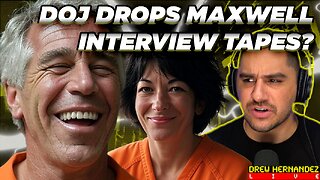Premium Only Content

The Perils of Believing Everything You’re Told Is True. Made by AI...
In a world saturated with information, it is crucial to approach what we hear, see, and read with discernment. Accepting everything at face value without critical analysis can lead to significant consequences, both individually and collectively. Believing everything we are told as absolute truth exposes us to manipulation, stunts intellectual growth, and contributes to the spread of misinformation, ultimately shaping a society that is easier to control and deceive.
The Risk of Manipulation.
One of the greatest dangers of blindly believing information is the risk of being manipulated. Throughout history, people in positions of power—whether political leaders, religious figures, or corporate entities—have used misinformation to control populations. Governments have spread propaganda, companies have exaggerated product benefits, and individuals have deceived others for personal gain. Those who lack skepticism are easy targets for such tactics, as they do not question the motives behind the information they receive. This can result in misguided loyalty, harmful decisions, and a distorted perception of reality.
Intellectual Stagnation.
Another major downside of accepting everything as truth is the stagnation of intellectual and personal growth. Critical thinking is a fundamental skill that allows individuals to analyze, evaluate, and form their own conclusions. If one unquestioningly accepts all information, they cease to engage in deeper thought and analysis. Without this intellectual engagement, innovation, creativity, and progress suffer. A society that does not question or challenge ideas will remain stagnant, never pushing the boundaries of knowledge or improving upon existing systems.
The Spread of Misinformation.
In today's digital age, misinformation spreads faster than ever. Social media platforms, news outlets, and online forums are filled with unverified claims, conspiracy theories, and false narratives. When people believe everything they encounter without verification, they unknowingly become participants in spreading falsehoods. This creates a dangerous cycle where misinformation influences decisions related to health, politics, and social issues. For example, during global crises, misinformation about vaccines, climate change, or economic policies can lead to widespread panic, division, and even harm.
Loss of Personal Agency.
Believing everything one is told also results in a loss of personal agency. Independent thought allows individuals to make informed choices based on logic and evidence. Without this ability, people become passive recipients of information rather than active participants in their own lives. When individuals do not question authority, policies, or societal norms, they may unknowingly support harmful agendas or accept injustices without resistance. History has shown that oppressive regimes thrive when people fail to challenge narratives imposed upon them.
Conclusion.
While it is essential to be open-minded and willing to learn, it is equally important to question and verify the information we receive. Accepting everything as truth without scrutiny leads to manipulation, intellectual stagnation, the spread of misinformation, and a loss of personal agency. A well-informed society is one that encourages critical thinking, values independent research, and challenges narratives that lack evidence. In an age where misinformation is abundant, the ability to question and analyze is not just a skill—it is a necessity for personal freedom and societal progress.
-
 LIVE
LIVE
Drew Hernandez
11 hours agoGHISLAINE MAXWELL SAYS CLAIMS EPSTEIN WAS INTELLIGENCE ASSET ARE BULLSH*T?!
649 watching -
 29:54
29:54
Afshin Rattansi's Going Underground
19 hours agoUkraine: Prof. Anatol Lieven SLAMS Europe’s ‘BLOODY STUPIDITY’ as Trump Negotiates with Putin
12.4K5 -
 15:27
15:27
robbijan
1 day ago $2.40 earnedThe Emperor’s New Labubu & The Spiritual War Behind Everything
42.9K42 -
 LIVE
LIVE
GritsGG
17 hours ago36 Hour Stream! Most Wins 3420+ 🧠
549 watching -
 2:05:47
2:05:47
TimcastIRL
5 hours agoTrump FBI Raids John Bolton Amid Classified Docs Investigation | Timcast IRL
164K65 -
 2:15:23
2:15:23
TheSaltyCracker
6 hours agoFinally Someone Gets Raided ReEEeStream 8-22-25
73.5K198 -
 2:59:21
2:59:21
I_Came_With_Fire_Podcast
18 hours agoChina's New Ship Killers, EU Dead, Shooter HOAX, and The Missing Woman
13.3K2 -
 3:46:26
3:46:26
SynthTrax & DJ Cheezus Livestreams
14 hours agoFriday Night Synthwave 80s 90s Electronica and more DJ MIX Livestream OUTSIDERZ Edition
21.8K -
 3:39:16
3:39:16
VapinGamers
5 hours ago $0.07 earnedFortnite Friday with BrianZGame and Community! #1 Controller Scrub NA - !rumbot !music
8.32K -
 5:00:14
5:00:14
iCheapshot
5 hours ago $0.02 earnedTrying Out The Finals | Complete Newb
5.6K3